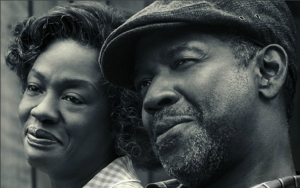FENCES: 4 STARS. “in ideas and performances ‘Fences’ hits a home run”
“Fences,” August Wilson’s rumination on race, masculinity, betrayal and dissatisfaction, won four Tony Awards, including best actor for James Earl Jones, when it first played on Broadway in 1983. The 2010 revival was also lauded, winning Tonys for Denzel Washington and Viola Davis, who now reunite in a big screen version of the popular play.
Set in 1950s Pittsburgh, Washington (who also directs) is Troy Maxson, a former Negro League baseball player now working as a garbage man. Each Friday he turns over his $76 weekly paycheck to wife Rose Maxson (Viola Davis) before his co-worker and best friend Jim Bono (Stephen Henderson) blow off some steam with a bottle of gin. Troy drunkenly tells wild stories about beating up the Devil and lectures about the virtues of self-reliance and responsibility to himself and his family. Always teetering on the edge of a blow-up, he’s a thin-skinned man in a world that is changing rapidly around him, who builds a literal and metaphorical fence between him and the outside world.
Troy has a combative relationship with Lyons (Russell Hornsby), his son from a previous marriage, and a strict, disciplinarian rapport with Cory (Jovan Adepo), his youngest who still lives at home. Tension builds as Cory decides he wants to take a football scholarship in favour of learning a trade.
It’s tempting to suggest that “Fences” doesn’t have a plot. Certainly it presents a slice of Troy and Rose’s life that isn’t necessarily driven by story in the strictest sense, but the through lines from scene to scene create a loose narrative that paints a vivid picture of a man whose resentments and bitterness will soon have a palpable effect on everyone around him.
As a director Washington doesn’t do much to open the story up. It takes place on a handful of sets and feels very much like a play, but when the words are this good there isn’t a need to spice it up with flashy production work. Washington focuses on the script and the performances, allowing the power of Wilson’s ideas carry the movie. “Fences” may be set in 1957 but the Troy’s sense of fighting against almost constant injustice feels as timely as it ever has.
Towering in the center of all this is Washington’s performance. His Troy is beaten down but not beaten. He’s hardened to the cruel realities of his life, that integration in baseball came just a few years too late for him to make a go of it, that hope is for dreamers too lazy to get a real job. He settles into the character with remarkable ease, erasing any residual memory of his big movie star turns in films like “American Gangster” or “Flight.” It is as though we’re seeing him for the first time, and yet, to many his story will feel all too familiar.
He finds his equal in Davis who brings a quiet dignity to the often put upon Rose. Her transformation from stay-at-home wife to independent woman as she realizes the eighteen years spent with Troy have not meant what she thought is as remarkable as it is subtle.
As Mr. Bono New York stage and screen actor Henderson rounds out the main cast in a performance brimming with wit and wisdom.
As a showcase for ideas and performances “Fences” hits a home run, offering fodder for Oscar talk and intellectual discourse. As a movie going experience, however, it feels a tad overlong. As much of a pleasure as it is to watch Washington, Davis and Henderson interact, the film loses steam as it enters the final third.

